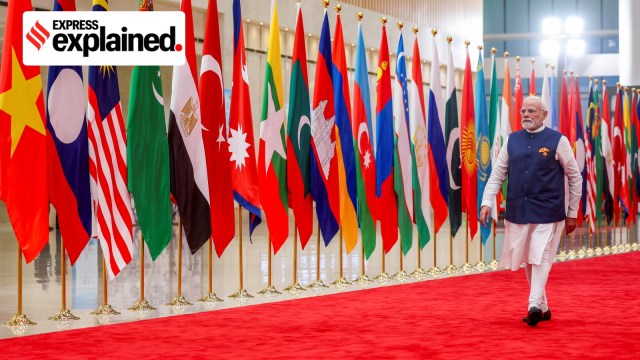25th SCO Summit 2025

- 05 Sep 2025
In News:
- The 25th Summit of the Shanghai Cooperation Organisation (SCO) was held in Tianjin, China, marking an important milestone in the evolution of the Eurasian grouping.
- Established in 2001 by China, Russia, Kazakhstan, Kyrgyzstan, Tajikistan and Uzbekistan, the SCO has since expanded to include India and Pakistan (2017), with 10 full members, 17 partners, and representation from Asia, Europe and Africa.
- At Tianjin, Laos was granted partner status, expanding the SCO’s reach and underlining its role as a pan-regional forum.
Major Decisions and Institutional Reforms
The summit adopted over 20 key documents shaping SCO’s long-term trajectory.
- Tianjin Declaration emerged as the central political statement, reaffirming commitments to peace, security and sustainable development.
- A Development Strategy (2026–2035) and Cooperation Programme (2026–2030) to counter extremist ideology were approved.
- A Roadmap for Energy Cooperation (till 2030) and new initiatives in digital economy, AI, climate-friendly industry and education were launched.
- Institutional strengthening included creation of four SCO centres for:
- Countering security threats,
- Combating organised crime,
- Cybersecurity, and
- Anti-drug cooperation.
- Decision was taken to establish an SCO Development Bank to finance infrastructure and social development.
- In a major structural reform, observer states and dialogue partners were merged into a single category of “SCO partners”, streamlining expansion and cooperation mechanisms.
Additionally, Cholpon Ata (Kyrgyzstan) was declared the SCO tourist and cultural capital for 2025–26, reinforcing people-to-people exchanges.
Counter-Terrorism and Security Dimensions
- Terrorism featured prominently in the summit’s deliberations. The Tianjin Declaration explicitly condemned the Pahalgam terror attack (April 2025) in India that killed 26 people, along with the Jaffer Express hijacking and Khuzdar school bus bombing in Pakistan.
- This mention was politically significant, as India had earlier refused to endorse the SCO Defence Ministers’ statement at Qingdao when terrorism concerns were omitted due to Pakistan’s objection.
- India’s firm stance ensured that the leaders’ summit corrected this omission, marking progress in embedding terrorism—including cross-border movement of terrorists—within the SCO’s security agenda. While the declaration avoided naming Pakistan, the acknowledgment of Pahalgam reflected growing recognition of India’s concerns.
India’s Strategic Priorities
Prime Minister Narendra Modi’s address outlined India’s SCO vision under three pillars—Security, Connectivity, and Opportunity:
- On security, he reiterated zero tolerance towards terrorism, radicalisation and terror financing, urging collective accountability for states that support cross-border terrorism.
- On connectivity, India reaffirmed support for projects like the Chabahar Port and the International North-South Transport Corridor, vital for regional integration while preserving strategic autonomy.
- On opportunities, India highlighted cooperation in start-ups, innovation, youth empowerment and cultural dialogue, including a proposal for a Civilizational Dialogue Forum to deepen mutual understanding.
India also supported SCO’s reformist agenda, especially new initiatives on organised crime, drug trafficking and cybersecurity, while calling for similar reforms in global institutions like the United Nations, to make them more representative and effective.
Geopolitical Context and India-China Dynamics
The summit was notable for PM Modi’s first visit to China in seven years and his meeting with President Xi Jinping. The inclusion of Pahalgam in the declaration is seen as a potential signal of Beijing’s willingness to recalibrate ties with New Delhi amid its global challenges, though the SCO stopped short of naming Pakistan. The China-Pakistan nexus, particularly through the China-Pakistan Economic Corridor, continues to limit consensus on terrorism.
Conclusion
The 25th SCO Summit in Tianjin highlighted the grouping’s evolution into a multidimensional platform addressing security, development, and institutional reforms. For India, it was a diplomatic success to have its terrorism concerns reflected in the final declaration, while also advancing connectivity and reformist goals. However, challenges remain in reconciling divergences within SCO, especially with China’s protective stance towards Pakistan. The summit underlines both the opportunities and limitations of India’s engagement with multilateral Eurasian forums, making it a crucial case study in India’s foreign policy strategy.
